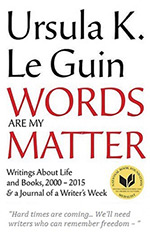
![]() charlesdee
charlesdee
2/9/2017
![]()
I seldom have as much pleasure in reading nonfiction as I do in a poem or a story. I can admire a well-made essay, but I'd rather follow a narrative than a thought.
With that somewhat odd opening sentence Ursula LeGuin introduces this new collection of her essays, reviews, public talks, and other occasional pieces. A few pages later she is even more to the point.
When it comes to sustained abstract thought, my attention span is slightly above that of a spaniel.
She says she struggles with her nonfiction, but as she has demonstrated in previous collections, signs of that struggle are subsumed in the precise, thoughtful, and engaging prose of her finished work. She is a pleasure to read as she ranges over those topics that have come under her gaze before but whose relevance has not faded. She often returns to the continued relegation of genre fiction to a sub-literary category identified with either children's stories or male adolescent wish-fulfillment fantasy. (The fact that that situation is becoming increasingly fluid must be due in some part to her own writing.) She welcomes the blurring of genres, but has no patience with those mainstream writers whose forays into fantasy and SF arrive with little knowledge of the field or suffused with the notion that writing about the fantastic provides a holiday from logic and narrative coherence. She both worries over yet has faith in the survival of the book, and she when she addresses the concern over the dwindling number of readers in the world she makes the argument that their numbers were never really that large. Feminism, when not the topic itself, informs everything she writes.
Given her preference for narrative, it is not surprising that one of her finest pieces is a the autobiographical essay, "Growing Up in a Work of Art." Her family lived outside Berkeley, California, in a house designed by Bernard Maybeck. In architectural literature, the house is still known as The Schneider House, the family for whom it was built in 1907. LeGuin's family, the Kroebers, lived there from 1925--1979. When they added onto it to accommodate four children, they did not face the opprobrium of architectural purists. Maybeck himself approved the changes when he visited late in his life, because he acknowledged his work was meant to be family home and not a monument to his genius. LeGuin's essay combines family anecdote with thoughts on how aesthetics can form the basis of an ethical sensibility.
Her selection of short reviews, written mostly for The Guardian over the past twenty years, range from the enthusiastic to the devastating. Reading them makes you appreciate that the authors under review have to work hard for her qualified praise. In the longer introductions she has written to new editions of works she admires, you share her pleasure in novels famous and obscure. She is at her best when she made me want to read books I'd never heard of, or set aside time to reread the short stories of H.G. Wells.